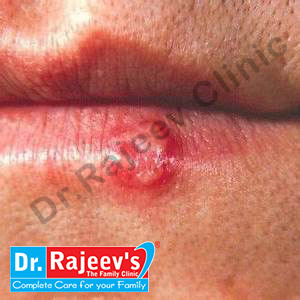

 Cold sores — also called fever blisters — are a common viral infection. there is a tiny, fluid-filled blisters on and around the lips. After the blisters break, a scab forms.
Cold sores — also called fever blisters — are a common viral infection. there is a tiny, fluid-filled blisters on and around the lips. After the blisters break, a scab forms.
Cold sores spread from person to person by close contact, such as kissing. They're usually caused by herpes simplex virus type 1 (HSV-1), and less commonly herpes simplex virus type 2 (HSV-2). Both of these viruses can affect our mouth or genitals and can be spread by oral sex. Cold sores are contagious even if you don't see the sores.
A cold sore usually passes through several stages:
some other symptoms include:
Children under 5 years old may have cold sores inside their mouths and the lesions are commonly mistaken for canker sores. Canker sores involve only the mucous membrane and aren't caused by the herpes simplex virus.
Cold sores are caused by certain strains of the herpes simplex virus (HSV).
HSV-1 usually causes cold sores.
HSV-2 is usually responsible for genital herpes. But either type can spread to the face or genitals through close contact, such as kissing or oral sex. Shared eating utensils, razors and towels might also spread.
Cold sores are most contagious when we have oozing blisters because the virus easily spreads through contact with infected body fluids. But you can spread the virus even if you don't have blisters. Many people who are infected with the virus that causes cold sores never develop signs and symptoms.
Once you've had an episode of herpes infection, the virus lies dormant in nerve cells in your skin and may emerge as another cold sore at the same place as before. Recurrence may be triggered by:
Actually homeopathic remedies for cold sores are meant to boost your immune system. its help to fight back against cold sores with a strong mind and body. The following are a few homeopathic remedies that have worked to minimize the appearance and pain associated with cold sores:
Nat Mur is commonly used for things like water retention, swelling, etc. It makes sense that it would reduce the swelling and overall appearance of blistering cold sores.
Very useful medicine for blister formation around the mouth which oozes discharge.